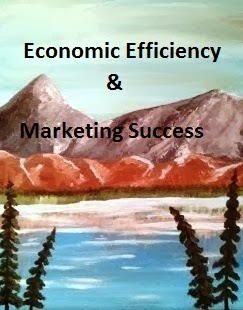 |
| Artwork: Dr. Murad Abel |
The bridge between economic growth and government efficiency
is not an easy one to find. There are many factors that go into the process of
building stronger economies, better societies, and more accountable government.
Research by Sirgy, et. al. (2012) helps to show how marketing activities
improvement of economic, social, health, and subjective health of a country is
mediated by economic efficiency. As marketing activity increases and government
oversight becomes more efficient the economy grows for the benefit of all
societal members.
Marketing Activity: The totality of marketing expenditures
throughout society that increase awareness of products and services that speed
up economic activity (Wilkie and Moore, 2007). This can be measured as dollar
amount of advertising expenditures per GDP.
It is tightly woven retailers that fulfill the needs of customer’s life
domains that enhance their quality of life. It improves upon information flow,
consumption opportunities and improves job opportunities.
Economic Efficiency:
When a country has lower levels of
corruption, more liquidity in movement of money, the informal market is small,
and additional employment opportunities it is said to be efficient (Matel et. al., 2010).
The overhead transactional costs related to corruption is low while the political
structure of the country allows money to move to those who have the abilities
to earn it. This translates into efficient opportunities, government oversight,
and skill based earning without a significance presence of the shadow market.
When marketing activity is high, information is readily
available, and people can make proper choices the economic activity increases.
This economic activity raises the lives of people and revenue throughout an
area. To maximize the benefits, government needs to be transparent, build
trust, and gain revenue off of transactions. Low government efficiency can damage economic
prospects for business by strengthening the shadow market that seeks to avoid
regulation/taxes.
Measurements for marketing activity include advertising
expenditure as a % of GNP and number of retail outlets per capita. Economic
efficiency can be measured from the Corruption Perception Index (CPI), Economic
Freedom Index (EFI), and shadow economy in % of GDP. Indicators of economic
well-being are seen through the measures of inflation, Consumer Price Index (CPI),
and GNI as international dollars using Purchasing Power Parity (PPP). Social
well-being is measured in adult literacy rates and net enrollment ratio in
secondary rules. Health Well-Being is measured in under-5 mortality rates,
maternal mortality ratio, life expectancy, and public expenditure on
health. Subjective Well-Being is the
subjective satisfaction of society-the happiness factor.
Through reviewing data of 133 nations the authors found that
economic efficiency has a significant impact on societal well –being.
Government efficiency is a mediator of this relationship. Societal Well-being is
defined as economic, social, health and subjective factors. As economic
efficiency increases so does the opportunities and choices of societal members.
Trust with the economy and government rises and this encourages greater
economic activity that benefits a whole range of societal members across a broad spectrum.
Comment: The
report helps us to understand there are multiple factors in building a strong
economy and society. Marketing gets out the “voice” on products and services
and provides opportunities for people to understand these products and where
they can be obtained. Government oversight can either damage economic growth or
encourage it. When officials are in doubt about when to increase or decrease
regulation it is beneficial see this through the lens of how this impacts
economic growth, societal development and the basic factors of trust that
underlines it all.
Matei, et. al. (2010). Public integrity, economic freedom
and government performance: a comparative study for the EU member states and
acceding countries. Theoretical and
Applied Economics, 18 (11)
Sirgy, M. (2010). Does marketing activity contribute to a
society’s well-being? The role of economic efficiency. Journal of Business Ethics, 107 (91).
Wilkie, W. & Moore, E. (2007). What does the definition
of marketing tell us about ourselves? Journal
of Public Policy and marketing, 26 (2).

